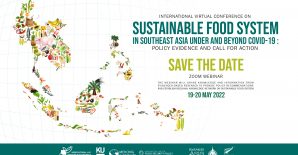IFPRI researchers Angga Pradesha and James Thurlow together with Anang Noegrohothe, of the National Development Planning Agency of Indonesia (BAPPENAS), and Syarifah Amaliah of IPB University used a SAM multiplier model to measure the economic impact of the Indonesia Large-scale Social Restriction Policy on the economy. The full paper can be viewed here.
Sustained economic growth and a declining trend in poverty over the years in Indonesia potentially will come to a halt this year. This development cost comes as a result of the COVID-19 pandemic outbreak that recently hit the country. Like in many other countries, one of the largest costs of COVID-19 comes from the social distancing policy, which is a proven public health measure to reduce the spread of the virus by limiting people’s movements and interactions for a certain period of time. The government of Indonesia adopted this approach by gradually introducing the Large-scale Social Restriction (PSBB) policy in certain regions from early April 2020. PSBB restricts non-essential economic activities and people’s movement in order to contain the virus. IFPRI, the National Development Planning Agency of Indonesia (BAPPENAS), and IPB University used a SAM multiplier model to measure the economic impact of PSBB if restrictions were to be in place for four weeks and to explore potential recovery processes after the policy ends. Results from the multiplier model show that the PSBB lockdown policy, despite being implemented for a relatively brief period and only in certain regions, will impose heavy economic costs.
National GDP is estimated to fall by 24.3 percent during the four-week PSBB period. Even though the impact mainly comes from the suspension on manufacturing and service sector activities, the contribution of external sector factors is still sizable, accounting for one-third of total GDP losses. The sectoral interlinkages that characterize Indonesia’s agri-food system also creates sizable GDP losses within the agriculture sector, even though farming activities are largely excluded from restrictions under PSBB policy. As lockdown measures are officially lifted, some restrictions, e.g., social distancing or border closures, are expected to remain in place for longer. Moreover, businesses may be slow to restart their operations and reach pre-crisis production levels. Under our fast and slow recovery model scenarios, we estimate that annual GDP growth in 2020 will be 5.3 to 7.3 percent lower than the baseline due to COVID-19. This means that the GDP growth in year 2020 could potentially be negative.
The production slowdown during the PSBB lockdown period translates into an immediate decline in employment income and an increase in national poverty by 13.3 percentage points. This substantial increase, albeit temporary, translates into an additional 35.9 million people falling into poverty during the four-week PSBB period. During the rest of 2020, as households’ current incomes recover to (almost) pre-crisis levels, the national poverty rate will be between 0.6 and 1.7 percentage points higher than at the start of the year. While the expected recovery is good news for households, millions of people will experience temporary hardships, especially during the second and third quarter, and will likely require government support.
Further analysis is needed to assess the impact of household support measures that have already been announced. However, the program should not be biased towards urban households alone – our results show that almost half of households that become poor during the PSBB period are rural households. Special support measures for the food system are also called for – not only to protect rural farm livelihoods, but to ensure stable and safe food supplies across value chains. Long-term investment in Indonesia’s agriculture and food systems is also essential to improve economic and household income resiliency against any potential major shocks in the future.
The full paper analyzing the impacts of COVID-19 on the Indonesian economy can be viewed here.



